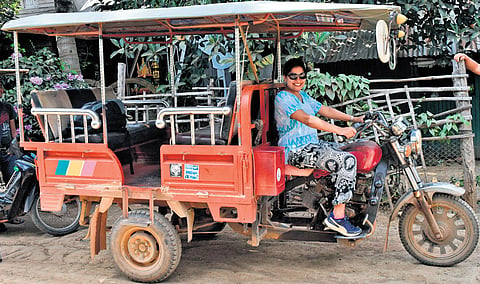

CHENNAI: There is something about solo travel that opens unexpected doors, both in the world and within oneself. Sumaa Tekur’s new book, The Monks Who Laughed When the Bumblebee Stung Me (Hay House; `269), captures these moments of serendipity as she journeys through 18 countries over 13 years. It is a reflection on solitude, inner discovery, and spiritual seeking.
The title stems from a seemingly ordinary moment that could have easily gone unnoticed. While visiting a monastery in Phnom Penh, Cambodia, Sumaa joined a group of monks for their meal. As a bee buzzed around her, she tried to shoo it away, causing the monks to laugh — not at her, but at the situation.
When the bee eventually stung her, their laughter grew, deepening the connection in that shared moment. Sumaa reflects, “It taught me how an unpleasant situation can be transformed into something lighter.” The sting became a symbol of letting go, of learning to laugh with life rather than resisting it.
Initially written as a straightforward travelogue before the pandemic, the book sat unpublished due to Covid-related delays. Eventually, Sumaa decided to shift its focus from the geographical narrative to her internal reflections. “I would categorise it as personal growth meets travel, spirituality, and female empowerment,” she explains.
The book is divided into six sections, each exploring different dimensions of her journey: meeting others, surrendering to the unknown, experiencing love in unexpected forms, and rediscovering belief. Yet at its core is the freedom and empowerment of solo travel.
For Sumaa, the essence of solo travel lies in the freedom to fully engage with an experience on one’s own terms, without the distractions or compromises that often come with group travel. “One of the biggest upsides is the freedom to stay with an emotion or an experience for as long as you need,” she says, emphasising the unique benefits this approach offers, particularly for women.
However, she does not overlook the risks women face when travelling alone. “Even in 2024, the world is not a safe place for women to travel,” she warns. “I can never let my guard down… You always have to remain vigilant, taking every precaution.” Tekur is candid about the societal scrutiny solo female travellers encounter, noting that questions like, “Where’s your husband?” or “Did your father allow you to travel alone?” are still common.
For those — women or men — seeking a guide to travel solo or looking for spiritual insight, the book offers an empowering roadmap. As Sumaa puts it, “It’s about elevating oneself to a higher plane of existence… It’s about learning to turn fear or discomfort into ease and joy.”